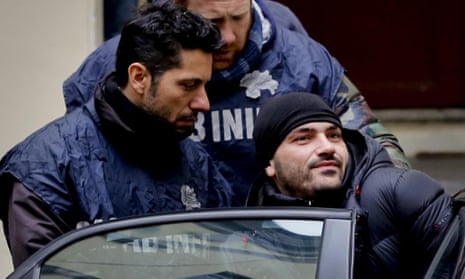Italian authorities have said they dismantled a mafia business group belonging to a clan headed by a woman known as the “Black Widow of the Camorra” and captured another leading figure in the Naples underworld.
Alessandro Giannelli, the fugitive boss of an increasingly influential Camorra clan that bears his name, was captured by police at dawn as he changed cars in an attempt to escape from the southern city, police said.
Giannelli, 38, has been implicated in a deadly turf war linked to the drugs trade that has claimed 10 lives in the Naples region since the start of 2016 and has resulted in the interior ministry considering sending in extra troops to try and stem the killing.
Separately, prosecutors in Rome said they had dismantled a business group with extensive interests in the fruit, vegetable and dairy sectors that was effectively a front for one of the longest-established and most influential Camorra clans, the Moccia.
Based in Afragola, a small town on the outskirts of Naples, the clan has been headed since the 1970s by matriarch Anna Mazza, the first women to be convicted in Italy of mafia association.
The so-called “Black Widow” took over after the killing of her husband Gennaro Moccia and went on to considerably expand the scope of the clan’s activities and its influence.
Luigi Moccia, reportedly the current business brains of the organisation, was one of five people placed in custody after Tuesday’s dawn raids. Two other men have been placed under house arrest following an investigation involving 160 officers.
The men are suspected of involvement in a mafia-style organisation and other crimes including exortion in connection with their company’s activity in wholesaling fruit, vegetables and mozzarella to customers including numerous restaurants in Rome and a national supermarket chain.
According to prosecutors the group had amassed investment capital of €15m and was preparing to expand its involvement in the food business to Barcelona and to the hotel sector in Rome.
Producers organisation Coldiretti said organised crime’s turnover in Italy’s high-value food sector was running at €15bn a year.
“Not only do they appropriate vast parts of the agro-food sector and the earnings they generate, destroying free market competition and choking honest entrepreneurs, they also gravely comprise the quality and safety of food, severely damaging the image of Italian products and the made in Italy brand,” the organisation said in a statement.
Italy’s interior minister, Angelino Alfano, hailed Tuesday’s arrests as “an important victory achieved by two high-quality investigations”.
Alfano said he would propose a reduction in the age of criminal responsibility to combat the growing numbers of 15 to 17-year-olds involved in the “baby gang” wave of violence in Naples.
“It is called a deterrent. We have to create a fear of the state’s reaction,” he said, voicing concerns that the new wave of Camorra gangsters believed they could rob and kill under the influence of narcotics with impunity.
“If it is needed we will increase the presence of the army,” Alfano said. Some 6,000 troops already patrol Italian towns and cities as part of the country’s “safe streets” anti-terrorism operation.
